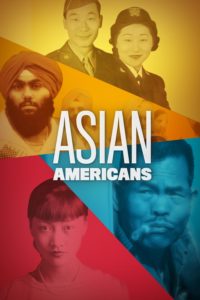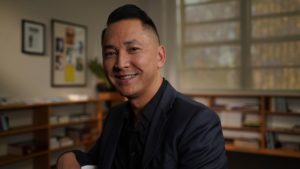Series Review: “Asian Americans” Offers a (Sleepy) Celebration of Its Subjects
Written by: Christopher Llewellyn Reed | May 11th, 2020

Asian Americans (Series Producer = Renee Tajima-Peña, 2020) 2½ out of 4 stars.
Premiering on PBS tonight at 9pm EST, the new five-part series Asian Americans (delivered in one-hour episodes, concluding tomorrow) chronicles the history, as the title would suggest, of Asians in America, from the 19th century to the present. While all too often staid in its aesthetic, adhering closely to the network’s longstanding, unadventurous formula of talking heads wedded to archival footage (the standard Ken Burns approach), the whole presented by an authoritative narrator, the series nevertheless offers a comprehensive look at the trials and tribulations of a vibrant, extremely heterogeneous immigrant group that has suffered no small share of hardships in its journey to now. The filmmaking may be somewhat dull, but the material is anything but.
The first episode, entitled “Breaking Ground (1850s-1920s)” examines the flow of migrant labor, primarily from China, that helped build the transcontinental railroad, completed on May 10, 1869. Even though the western portion could not have been constructed without the Chinese, we see how they were excluded from the celebration. That’s not all they were excluded from, as soon – with European fears about an Asian invasion, married to deep racism, rising – they, along with would-be immigrants from Japan, the Philippines, India and other Asian countries, would find themselves banned, if not always from entry, at least from citizenship. Certainly, a few lucky and entrepreneurial souls would succeed above the rest, but overall it was a tough life, marked by discrimination at best and lynchings at worst.

Next, in the second episode, entitled “A Question of Loyalty (1920s-1940s), we follow the changes in circumstances from bad to tolerable that were then undone, at least for the Japanese, during World War II. From there, Episode 3 – “Good Americans (1950s-1960s)” – analyzes how the warring tendencies of anti-communist hysteria and model-minority acceptance played out. Then, Episodes 4 and 5 – “Generation Rising (1960s-1970s)” and “Breaking Through (1980s-2010s)” – walk us through how the tumultuous student uprisings of 1968 empowered Asian American youth of the time to embrace a new agency, and how the subsequent developing of political capital has slowly led to better conditions for once sidelined communities. The world is far from perfect today, but it is better than it was.
Beyond those people we see in old films and photographs, the filmmakers have gathered solid testimonials from experts and descendants of first-generation immigrants to support the narrative. These include folks such as actor Randall Park; entrepreneur Jerry Yang; academics/historians Laureen Chew, Erika Lee and Nayan Shah; journalists Jeff Chang and Helen Zia; politicians Dick Durbin and Tammy Duckworth; and writers David Henry Hwang, Angela Oh and Viet Thanh Nguyen. Actors Daniel Dae Kim and Tamlyn Tomita narrate the series, he taking three, and she two, episodes each. We could use more of the cinematic energy that Randall Park extolls in the Bruce Lee performances that so inspired him as a kid, but the information is still good. Asian Americans have contributed a lot to this nation’s history and prosperity. It’s long past time to celebrate them in turn.


